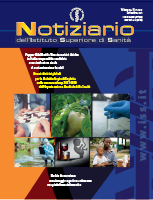Monthly newsletter on current information on institutional activities: research and other activities carried on at ISS, conference reports, and publications updatings.
It is in Italian, but all articles have an English abstract.
Issues published before 2020 are available at https://www.iss.it/it/notiziario




